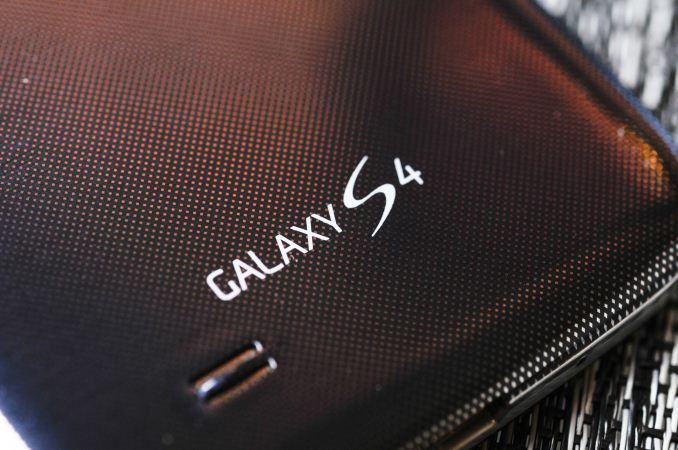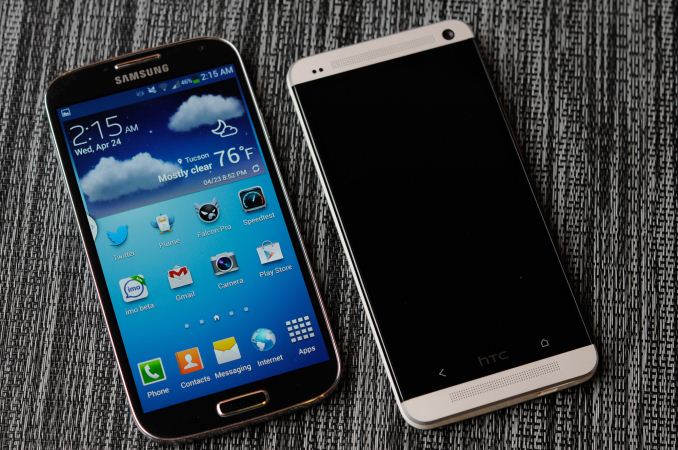Samsung Galaxy S 4 Review - Part 1
by Brian Klug on April 24, 2013 12:01 AM ESTFinal Words
Samsung has done a tremendous job creating a global following not only for its brand, but also for its software. In studying Samsung and its devices it becomes quite clear that although many enthusiasts yearn for pure, unadulterated Android, there are seemingly big pockets of the market who have grown used to (and maybe even desire?) Samsung's TouchWiz user experience. It really is a very clever strategy on Samsung's part. If you deliver products that your users appreciate, and deliver a uniquely different user interface at the same time, you begin to create an appreciation for that user interface as well. All of this flies in the face of what we as reviewers normally seem to prefer, but Samsung's success is proof of the fact that not everyone absolutely detests OEM customized Android.
Samsung's existing user base is likely the easiest to talk to about the Galaxy S 4. Compared to any previous Galaxy S device, the SGS4 is a clear step forward in all of the right areas. The display is higher resolution, the SoC is significantly faster, there's better WiFi (and connectivity depending on what generation of Galaxy S you're talking about) and obviously the Galaxy S 4 runs the absolute latest version of Android. Even on the camera side, Samsung has improved imaging performance over the Galaxy S 3 this generation thanks to its use of a wider aperture lens system. If you're a happy owner of a Samsung Galaxy S/S2/S3, you'll likely be a happy owner of a Galaxy S 4.
It's when you compare the Galaxy S 4 to its chief technical competitor, the HTC One, that the discussion becomes more complicated. HTC and Samsung take very different approaches to nearly every aspect of their flagship smartphones. Whether it's display (LCD vs. Super AMOLED), camera (low light vs. well lit performance), or software (subtle Sense 5 or feature filled TouchWiz), you couldn't pick two more different players in the Android space. So which is better?
It really depends on what you value more. The One's camera delivers better low light performance, while the Galaxy S 4's camera delivers better performance in well lit (e.g. outdoor) scenarios. The One's software customizations are definitely more subtle and out of your way, while Samsung's approach is much more feature overload and in your face. It's difficult to say for sure given our Sprint review unit, but HTC likely gets the slight edge in battery life based on our results here today (although these two devices can be close competitors depending on the workload). Samsung does integrate the faster SoC, despite both the Galaxy S 4 and HTC One shipping the same Snapdragon 600 platform. Samsung and HTC remain on opposite sides of the removable battery/microSD fence, if those two things matter to you then Samsung is the obvious choice. Finally there's a question of how much you value/desire an all-metal smartphone. For some, Samsung's choice in materials is going to continue to be a very big issue.
At the end of the day, the Galaxy S 4 is an evolution of the Galaxy S 3 in pretty much all of the areas you'd expect it to be. Whether or not that's what you wanted in a new Android smartphone is going to vary from one person to the next. The good news is that you at least have a choice.












335 Comments
View All Comments
Exodite - Wednesday, April 24, 2013 - link
The screen I'd imagine.The iPhone 5 has a screen that's ~65% the size, and ~35% of the resolution, of the one used by the Galaxy S4.
Its not the only reason of course but the screen matters a lot.
gnx - Wednesday, April 24, 2013 - link
Also a weakness of AMOLED. Since it needs to lighten up all subpixels max to get to white (and turns off all subpixels for gorgeous black). So web browsing, with so most sites having white background, really cranks up the power consumption of the display, hence the unexpectedly shorter battery life compared to other scenarios.sigmatau - Thursday, April 25, 2013 - link
I have a Nokia 900 with a Samsung sourced AMOLED plus which is beyond terrible outside on full brightness. I wonder how this one compares.lopri - Wednesday, April 24, 2013 - link
In that chart, iPhone 4S is leading Nexus 4. I have both and I call that bogus. Not sure what kind of iPhone 4S they've got.kmmatney - Wednesday, April 24, 2013 - link
We have mostly iPhones at my work, but a few SG3s. It's pretty easy to compare the real-use battery life at a conference, where we have to be on battery all day, and use are phones for normal stuff like email, texts, some web browsing, etc.. Without fail, the iPhones are all still going strong at the end of the day, while the SG3s have dead batteries. I was hoping the SGS4 would fix this, but I can't tell from the review. I hope the Note 3 increases the battery life.RealityMonster - Monday, April 29, 2013 - link
Apple has consistently refused to put tech in their phones unless they can still get 10hrs of battery life out of it. That's why the iPhone 5 is the first one to have LTE--the 4s just couldn't keep a charge long enough. Part of it is the form-factor, since a smaller phone means a smaller battery. Like other people have mentioned, though, the smaller screen is also a smaller power draw.So while you're never likely to see an iPhone that has a substantially better battery life than 10hrs under browsing conditions, you'll never see one that has a substantially lower life, either.
Gorgenapper - Tuesday, May 14, 2013 - link
That's a nice thing about Apple, they have a MUCH tighter control on their design and execution than Samsung ever could. People love to bash on Apple, and I admit that I'm not a big fan of many of Apple's decisions and products, but at least they know what they want to do, and go after it.Samsung, on the other hand, is more concerned with features, and less concerned with the quality of the execution of their overall product plan. I also get a vibe that Samsung caters more directly to the 'buy and throw away' mentality of most consumers, as OLEDs degrade at a faster rate than LCD (particularly blue subpixels), which was a reason why Samsung said that they used a pentile arrangement on the S3.
As for me, personally, I think I'll wait to see how the next gen iPhone looks like (rumored 4.5 ~ 4.8" screen), or more likely I'll wait to see how the next gen Nexus is. Assuming that I can't score a cheap 32gb Galaxy S4 after the big hype dies down.
mike55 - Wednesday, April 24, 2013 - link
I'm definitely torn between this and the HTC One. I'm also a bit disappointed that 32 GB of NAND isn't the standard minimum for flagship smartphones these days.Toss3 - Wednesday, April 24, 2013 - link
Both are great phones, but I'm buying the S4 because of the larger screen and smaller bezel. I also cannot stand the button layout of the HTC One. Was very surprised to see that the HTC One was very fluid, whereas the S4 stutters a bit. Especially considering the latter runs the SoC at a higher clockspeed. I also believe the camera of the S4 to be superior; even if the HTC One takes better night-shots, they're still not good enough for print or even watching on a 1080p TV(lots of noise and weird white-balance). The daylight shots from the S4 look pretty good, and are among the best of any phone right now.UpSpin - Wednesday, April 24, 2013 - link
4MP (2688x1520) translates to 22,76x12,87cm (8,96x5,067in) @ 300 DPI print resolution, I think that's enough. It's also above 1080p. People also forget that the HTC One contains a simple OIS!http://www.htc.com/www/zoe/stabilization/
But you're right, at best lightnig conditions, the S4 is superior, but I mostly never take pictures at best lightning conditions, but outside on a normal day, indoors poorly lit or indoors to scan documents.
According to other reviews the S4 stutters because of the gimmick features, once you turn off those advertised stuff, it should run better.